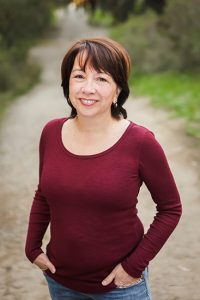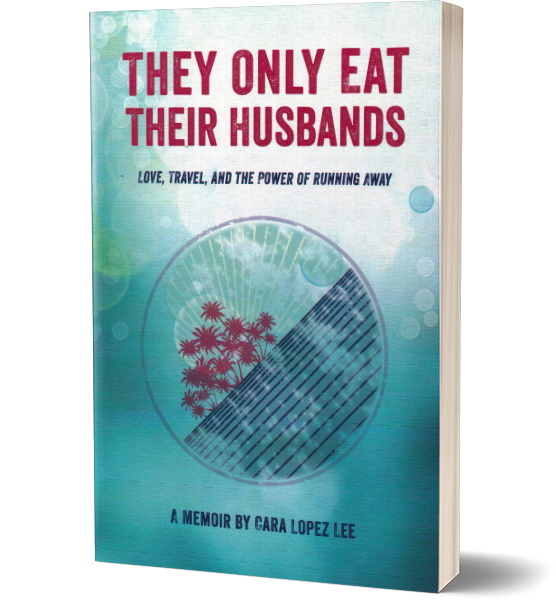I knew that, even traveling in my own country, I’d encounter people whose worldviews differed from mine. This is one reason I decided to stick to western states on my book tour. Still, venturing outside my comfort zone so close to home has revealed some of the most challenging differences of all, the ones so small you can trip over them before you see them.
On April 2, I drove to Grants Pass, Oregon, last stop on my way home to California, to spend the night with my high school sweetheart and his wife. When I later told this to my 14-year-old sister, she asked, “Wasn’t that awkward?” I explained, “That was 30 years ago.” Yet, although he and his wife were generous, intelligent, fun hosts… of course there were awkward moments. Just not for the reasons my sister thought.
I immediately liked my friend’s wife when she answered the phone and gave me laughing, step-by-step directions to their sub-rural home: “Did you pass the flashing signal?” “I never saw a flashing signal.” “I’m sure there’s a flashing signal.” When I arrived it felt natural to throw our arms around each other. She was effusive in her praise for my book, recognizing bits of her own story in my difficult relationship with my father. Meanwhile, I processed the shocking reminder that my old rock-n-roll boyfriend, once a cross between Peter Frampton and David Lee Roth, is now a bald, 51-year-old, heart-attack survivor.
The three of us talked about books, movies, and the scary hospital where she was almost killed by “Dr. Skippy,” who insisted she couldn’t be sick after all the antibiotics he gave her. It was an invigorating conversation, until we opened a door to politics. My friend said, “I understand that all religions have extremists, but Muslim countries are the only ones where we keep hearing about men stoning women to death.” I countered that many of those countries also have more poverty and ignorance. We had similar disagreements 30 years ago.

I hit the road for Northern California. (That’s Mount Shasta in the background.)
The next day, my friend bought me breakfast at Shari’s, where we congratulated each other on finding supportive spouses, raising smart kids (him), and writing a book (me). Our mutual admiration held past echoes of a vanished crush, and future echoes of lifelong friendship – despite the fact that I thought District 9 was fantastic and he thought it was weird. I kissed his cheek and hit the road for Northern California.
In Oakland, I spent two nights with a friend I’d met at a writers’ conference a couple of years ago. We’d clicked so instantly on first meeting that it felt as if we were friends from another life. Yet, I don’t believe it’s possible to know whether we’ve had past lives, just as I don’t believe astral bodies light-years away influence my life. Yet she talked a lot about these sorts of things, always prefacing her remarks with a polite, “I know you don’t believe in this, but…”
Her politeness didn’t end there: she generously gave up her room for me, treated me to a multiple-course dinner at her favorite Greek restaurant, and validated our shared experiences as women eager to voice our truth yet sometimes thwarted by those who don’t want to hear it. Yet, at times I felt as if she were trying to proselytize me to her brand of spirituality. This forced me to consider whether that’s how others feel when I share my spiritual philosophies.
It didn’t help when I tried to make ordinary conversation: “I wish my husband would exercise more.” I said that I worried his sedentary ways might affect his health and our romantic life. This prompted a coaching session – she’s a life transitions coach – “Have you told him how you feel?” “How did you tell him?” “Do you see how you’re taking responsibility for things he should take responsibility for?” “What do you really want?” Sometimes I appreciate this, but in the middle of a four-week, 5000-mile tour, I found the Q&A exhausting, so I said, “I really don’t want to think about it anymore.”
To her this was apparently a signal that she was on to something. So she rephrased, “You must want something. What is it?”
I just stared.
I later told my stepmother, “I wanted to say, ‘I don’t need you to grow me, thank you very much.’” But how could I say that to someone who opened her home and heart to me? No doubt she was offering me a gift, and just didn’t know it wasn’t my size or color. I’d come home to California, yet at moments I felt alienated. Still, when she took me for a walk around her neighborhood, we were both awestruck by the blossoming trees, a gift that fit just right.


We were both awestruck by the blossoming trees, a gift that fit just right.
On my second day, I had coffee in San Francisco with a friend I’d met on Twitter. Mark is a Texan with Mexican roots, who once harbored stereotypes about what a dangerous, backward country Mexico was. Then he started traveling there, and now he writes a blog called Mexico Unmasked to demystify the country for other Americans. An interesting coincidence: my coaching friend primarily travels in Greece and blogs about that. I admire their openness to throw themselves into another culture with passion and purpose.
On Tuesday, April 5, I read from my memoir at The Sleeping Lady Café in Fairfax, about a half-hour from San Francisco, a communal-feeling little joint where musicians play nightly. I’m not a musician, and the dinner crowd looked stricken when I grabbed the mic and started talking. A couple of tables left. But Mark, my coach friend, and one of her friends had come to hear me read, so I did, my shortest reading ever – while a table of four young women talked at top volume. When I rejoined my friends, I said, “Do I know how to clear a room, or what?”
I was glad my next stop was Southern California’s Moorpark and the warm embrace of family.

I was glad my next stop was Southern California’s Moorpark.
I used to worry that sharing some of my family’s dysfunction in my book would alienate my father. Instead, it has helped us let go of the past and grow closer. For my visit, Dad made homemade beans — so Mexican — and brown rice — so macrobiotic. When he served flour tortillas — so Californian — he said, “I know they’re not healthy, but they’re tough to give up.”
“There are two things I’ll never give up,” I said, “flour tortillas and ice cream.” Dad is so self-disciplined he probably could let those things go, but he chuckled with understanding.
My dad and stepmom asked for stories of the road, and didn’t seem exasperated when I monopolized the conversation as usual – but rather, entertained and supportive. I said that my friend the coach, a believer in the sacred feminine, had told me, “You write about relationships like a man.”
My father said, “The next time someone tells you they’re into the sacred feminine, just tell them, ‘I believe in the sacred possom.’”

My father said, “The next time someone tells you they’re into the sacred feminine, just tell them, ‘I believe in the sacred possom.’”
At days end, I realized that my sister’s new life among her peers has added an awkward element to our conversations, and I’ve let that scare me away from talking to her as much as I used to. So I asked her to visit with me after she finished homework, and as we lay in my bed giggling I remembered that love doesn’t have to understand, or know what to say, only to be present and accept.
The next night I gave a Girls Trek Too workshop at the Northridge REI. Only two women came, but we enjoyed sharing our passion for the road less traveled. One of them envisions the enchanting idea of traveling the globe writing poems and handing them out to people. Yet she plans to remain anchored to Los Angeles. I remember when I moved away from LA my father said, “You’ll be back.” That was 25 years ago.
On Friday, April 8, I sat at the Literati Café, where I’d invited my LA friends to say hello. No one came. I didn’t take offense, just accepted another sign that, while we’ll always love each other, our lives keep moving on. While I drank chai, I watched people come and go, talking fast and furious about slow and deep things, dressed up and yet casual, different races sharing one edgy, urban feel. This is LA.
For now, Denver is home, with its easy-going, wide-open, indoor-outdoor ways. Yet, as I quoted a Greek man in my memoir, “It is difficult for people like us to say this place is home or that place is home. It is difficult to stay in one place. You always make new friends, yet it is lonely.”
Such is the life of a traveler, even when going home. Navigating micro-cultures can be disorienting, even from household to household. Yet outside the comfort zone is where I come to life.




